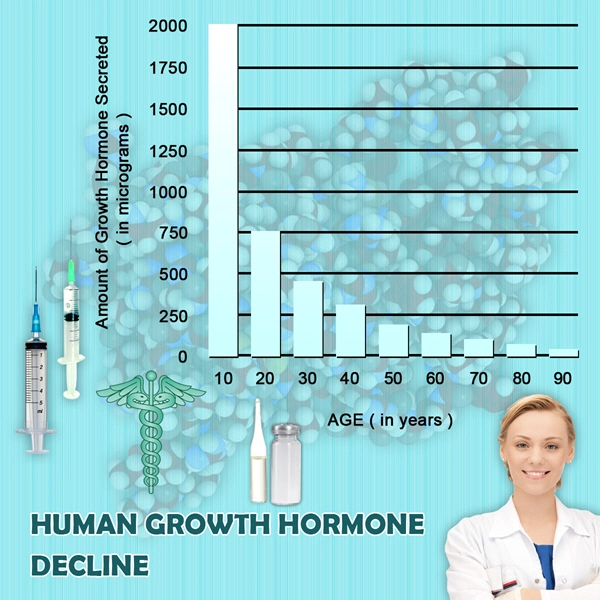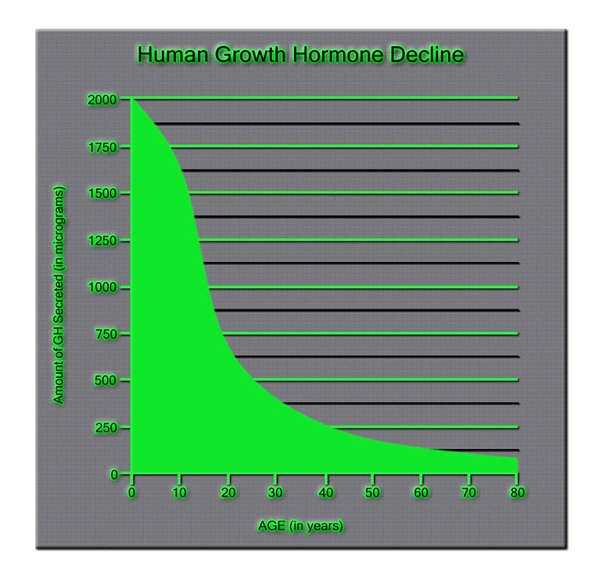Introduction to Peptide Therapy
Peptides, small chains of amino acids linked by peptide bonds, have recently garnered significant attention in the realm of neurological research. Unlike traditional pharmaceuticals, peptides can offer high specificity and efficacy with potentially lower toxicity and fewer side effects. This makes them particularly appealing as therapeutic agents in treating complex neurological disorders, which often require precise molecular targeting without disrupting other physiological functions.
Peptides and Neurodegenerative Diseases
One of the most promising areas of peptide research is in the treatment of neurodegenerative diseases such as Alzheimer's, Parkinson's, and Huntington's disease. These conditions are characterized by the progressive loss of structure or function of neurons, leading to severe cognitive and motor deficits. Peptides can be designed to interfere with the pathological processes underlying these diseases. For instance, certain peptides have been shown to inhibit the aggregation of beta-amyloid plaques in Alzheimer’s disease, a key factor in the disease’s progression. Similarly, other peptides have the potential to modulate the aggregation of alpha-synuclein protein in Parkinson’s disease, offering a novel approach to halt or possibly reverse the disease's effects.
Peptides in Stroke and Trauma
Beyond degenerative diseases, peptides also show potential in acute neurological conditions such as stroke and traumatic brain injury (TBI). These conditions often cause significant neuronal damage due to inflammation and oxidative stress. Peptides can be engineered to enhance neuroprotection by modulating these pathways. For example, some peptides possess anti-inflammatory properties that can reduce the swelling and damage following a stroke or TBI. Others might help in neuroregeneration by promoting the repair mechanisms of the central nervous system.
Challenges and Considerations
Despite their potential, the use of peptides in neurological disorders faces several challenges. One major hurdle is delivery; peptides need to cross the blood-brain barrier (BBB), a highly selective barrier that prevents most drugs from entering the brain. Innovative strategies such as coupling peptides with nanoparticles or using BBB-shuttle peptides are currently under research to overcome this obstacle. Additionally, the stability of peptides in the bloodstream and their potential immunogenicity also require careful consideration to ensure safety and efficacy in long-term treatments.
Future Directions
The future of peptide therapy in neurology is vibrant and expanding. Ongoing advancements in peptide engineering and delivery are expected to enhance their therapeutic potential dramatically. Moreover, as we gain deeper insights into the molecular pathways of neurological disorders, new peptide targets are likely to emerge, broadening the scope of peptide applications in neurology.
Conclusion
For American males, who statistically face significant risks of neurological disorders, the development of peptide-based therapies could represent a significant advancement in medical treatment options. It is a field that promises not only to extend life but also to enhance the quality of life, offering hope where traditional medications have fallen short. As research progresses, it will be crucial to monitor clinical trials and results to understand better how peptides can be most effectively utilized in neurology.

- Nicotinamide-N-methyltransferase (NNMT) Versus Its Inhibitor, a new way to promote weight loss? [Last Updated On: August 24th, 2025] [Originally Added On: May 27th, 2021]
- Ipamorelin: A Safe and Effective Alternative to HGH Injections [Last Updated On: May 29th, 2025] [Originally Added On: August 6th, 2021]
- Peptides: Unleashing Potential in Modern Medicine [Last Updated On: March 2nd, 2025] [Originally Added On: March 2nd, 2025]
- Exploring the Role of Peptides in Diabetes Management: Advances and Therapeutic Potential [Last Updated On: March 3rd, 2025] [Originally Added On: March 3rd, 2025]
- Exploring Peptide-Based Immunotherapy: Advances and Challenges in Cancer Treatment [Last Updated On: March 5th, 2025] [Originally Added On: March 5th, 2025]
- Unlocking the Fountain of Youth: Exploring the Anti-Ageing Potential of Peptides [Last Updated On: March 6th, 2025] [Originally Added On: March 5th, 2025]
- Revolutionizing Men's Health: Peptide Therapeutics in Chronic Disease Management [Last Updated On: March 6th, 2025] [Originally Added On: March 6th, 2025]
- Antimicrobial Peptides: A Promising Solution for Men's Health Against Bacterial Infections [Last Updated On: March 7th, 2025] [Originally Added On: March 7th, 2025]
- Exploring the Frontier: The Evolving Role of Peptides in Allergy Treatment for American Males [Last Updated On: March 7th, 2025] [Originally Added On: March 7th, 2025]
- Peptides in Dermatology: Transforming Men's Skincare for Youthful Skin Health [Last Updated On: March 8th, 2025] [Originally Added On: March 8th, 2025]
- Revolutionizing Male Health: Harnessing Biomimetic Peptides for Regenerative Medicine Advancements [Last Updated On: March 9th, 2025] [Originally Added On: March 9th, 2025]
- Unlocking the Potential of Therapeutic Proteins and Peptides: Advances and Obstacles in Modern Medicine [Last Updated On: March 12th, 2025] [Originally Added On: March 12th, 2025]
- Peptides and Epigenetics: Impact on American Male Health and Disease [Last Updated On: March 13th, 2025] [Originally Added On: March 13th, 2025]
- Peptides Pioneering Personalized Medicine: A New Frontier for American Men [Last Updated On: March 13th, 2025] [Originally Added On: March 13th, 2025]
- Unveiling the Power of Peptides in Wound Healing and Tissue Repair for American Males [Last Updated On: March 15th, 2025] [Originally Added On: March 15th, 2025]
- Peptides and Gene Therapy: Revolutionizing Health for American Males [Last Updated On: March 17th, 2025] [Originally Added On: March 17th, 2025]
- Peptide Vaccines: A Promising Frontier for American Males' Health [Last Updated On: March 18th, 2025] [Originally Added On: March 18th, 2025]
- Peptide Therapies: A Promising Approach to Combat Obesity in American Males [Last Updated On: March 18th, 2025] [Originally Added On: March 18th, 2025]
- Peptides: A New Frontier in Managing Respiratory Health for American Males [Last Updated On: March 19th, 2025] [Originally Added On: March 19th, 2025]
- Peptide-Enhanced Stem Cell Therapies: Revolutionizing Health for American Males [Last Updated On: March 19th, 2025] [Originally Added On: March 19th, 2025]
- Peptides: A Promising Solution for Metabolic Disorders in American Males [Last Updated On: March 19th, 2025] [Originally Added On: March 19th, 2025]
- Peptides in Veterinary Medicine: Enhancing Animal Health and Performance [Last Updated On: March 20th, 2025] [Originally Added On: March 20th, 2025]
- Peptide Therapeutics: Revolutionizing Chronic Disease Management for American Males [Last Updated On: March 20th, 2025] [Originally Added On: March 20th, 2025]
- Peptides: Enhancing Health and Performance in American Males [Last Updated On: March 21st, 2025] [Originally Added On: March 21st, 2025]
- Peptides: Revolutionizing Men's Health in Muscle Growth, Anti-Aging, and More [Last Updated On: March 21st, 2025] [Originally Added On: March 21st, 2025]
- Peptides: A New Frontier in Fighting Infectious Diseases for American Males [Last Updated On: March 21st, 2025] [Originally Added On: March 21st, 2025]
- Peptides: Revolutionizing Diagnostics and Drug Delivery for American Males' Health [Last Updated On: March 22nd, 2025] [Originally Added On: March 22nd, 2025]
- Peptides Revolutionizing Eye Health Treatment for American Males [Last Updated On: March 22nd, 2025] [Originally Added On: March 22nd, 2025]
- Peptide Therapies: A New Frontier for Treating Rheumatic Diseases in American Males [Last Updated On: March 22nd, 2025] [Originally Added On: March 22nd, 2025]
- Peptides: A Promising Solution for Hair Loss in American Males [Last Updated On: March 23rd, 2025] [Originally Added On: March 23rd, 2025]
- Peptides in Endocrinology: Managing Diabetes, Growth Hormone, and Testosterone in American Males [Last Updated On: March 24th, 2025] [Originally Added On: March 24th, 2025]
- Bioactive Peptides: Enhancing Men's Health from Muscle to Cancer Prevention [Last Updated On: March 24th, 2025] [Originally Added On: March 24th, 2025]
- Peptides and Male Fertility: Exploring Therapeutic Potential and Future Directions [Last Updated On: March 24th, 2025] [Originally Added On: March 24th, 2025]
- Peptides' Role in Enhancing Liver Health for American Males: A Scientific Overview [Last Updated On: March 24th, 2025] [Originally Added On: March 24th, 2025]
- Peptide-Based HIV Vaccines: Progress and Promise for American Males [Last Updated On: March 24th, 2025] [Originally Added On: March 24th, 2025]
- Peptides: A New Frontier in Mental Health for American Males [Last Updated On: March 25th, 2025] [Originally Added On: March 25th, 2025]
- Peptide Therapies Revolutionizing Transplant Medicine for American Males [Last Updated On: March 25th, 2025] [Originally Added On: March 25th, 2025]
- Peptides Revolutionize Toxicology: Diagnostics, Therapeutics, and Vaccines for American Males [Last Updated On: March 25th, 2025] [Originally Added On: March 25th, 2025]
- Peptide Radiopharmaceuticals: Advancing Men's Health in Cancer and Cardiovascular Care [Last Updated On: March 25th, 2025] [Originally Added On: March 25th, 2025]
- Peptides: A Revolutionary Approach to Cardiovascular Health for American Men [Last Updated On: March 25th, 2025] [Originally Added On: March 25th, 2025]
- Peptides: Enhancing Gut Health and Well-being in American Males [Last Updated On: March 25th, 2025] [Originally Added On: March 25th, 2025]
- Peptide-Based Biomarkers: Revolutionizing Disease Detection in American Males [Last Updated On: March 25th, 2025] [Originally Added On: March 25th, 2025]
- Peptides Revolutionizing Dentistry: Benefits for American Men's Oral Health [Last Updated On: March 25th, 2025] [Originally Added On: March 25th, 2025]
- Peptides Offer Hope for American Males with Neuropathic Pain: Recent Research Insights [Last Updated On: March 25th, 2025] [Originally Added On: March 25th, 2025]
- Peptides Revolutionizing Sports Medicine: Enhancing Performance and Recovery in Athletes [Last Updated On: March 25th, 2025] [Originally Added On: March 25th, 2025]
- Peptide-Enriched Skincare: Benefits and Advances for American Males [Last Updated On: March 25th, 2025] [Originally Added On: March 25th, 2025]
- Peptide Therapeutics: Targeted Hope for American Males with Rare Diseases [Last Updated On: March 26th, 2025] [Originally Added On: March 26th, 2025]
- Peptide Drugs in Pediatrics: Targeted Treatments for American Males' Children [Last Updated On: March 26th, 2025] [Originally Added On: March 26th, 2025]
- Stem Cells and Peptides: Revolutionizing Regenerative Medicine for American Males [Last Updated On: March 26th, 2025] [Originally Added On: March 26th, 2025]
- Peptides Revolutionizing Trauma Care: From Hemostasis to Neuroprotection [Last Updated On: March 26th, 2025] [Originally Added On: March 26th, 2025]
- Peptide Nanotechnology: Revolutionizing Cancer, Heart Disease, and Diabetes Treatment for American Males [Last Updated On: March 26th, 2025] [Originally Added On: March 26th, 2025]
- Peptides Enhance Photodynamic Therapy: A Promising Treatment for American Men's Health [Last Updated On: March 26th, 2025] [Originally Added On: March 26th, 2025]
- Peptide Vaccines: Revolutionizing Disease Prevention in Veterinary Medicine [Last Updated On: March 26th, 2025] [Originally Added On: March 26th, 2025]
- Peptides in Stroke Recovery: Potential and Challenges for American Males [Last Updated On: March 27th, 2025] [Originally Added On: March 27th, 2025]
- Peptide Bioinformatics: Revolutionizing Precision Medicine for American Males [Last Updated On: March 27th, 2025] [Originally Added On: March 27th, 2025]
- Peptide Therapies: Revolutionizing Gastrointestinal Health for American Males [Last Updated On: March 27th, 2025] [Originally Added On: March 27th, 2025]
- Peptides in Epilepsy: New Hope for American Males' Treatment and Management [Last Updated On: March 28th, 2025] [Originally Added On: March 28th, 2025]
- Peptide-Based Biosensors: Revolutionizing Early Disease Detection in American Males [Last Updated On: March 28th, 2025] [Originally Added On: March 28th, 2025]
- Peptides: A Promising Solution to Antibiotic Resistance in American Males [Last Updated On: March 28th, 2025] [Originally Added On: March 28th, 2025]
- Peptide Therapy: A New Hope for American Men with Neurodegenerative Diseases [Last Updated On: March 28th, 2025] [Originally Added On: March 28th, 2025]
- Peptide Therapies: Enhancing Bone Health in American Males [Last Updated On: March 28th, 2025] [Originally Added On: March 28th, 2025]
- Peptides: A Targeted Approach to Managing Inflammation in American Males [Last Updated On: March 28th, 2025] [Originally Added On: March 28th, 2025]
- Peptide Therapy: A New Hope for American Males with Hematological Disorders [Last Updated On: March 29th, 2025] [Originally Added On: March 29th, 2025]
- Peptide-Based Anti-venoms: Revolutionizing Snakebite Treatment for American Males [Last Updated On: March 29th, 2025] [Originally Added On: March 29th, 2025]
- Peptide-Polymer Composites: Revolutionizing Targeted Therapy for American Males [Last Updated On: March 29th, 2025] [Originally Added On: March 29th, 2025]
- Peptides as Cell-Penetrating Agents: Revolutionizing Men's Health Treatments [Last Updated On: March 30th, 2025] [Originally Added On: March 30th, 2025]
- Peptides in Burn Wound Management: Healing and Scar Reduction for American Males [Last Updated On: April 1st, 2025] [Originally Added On: April 1st, 2025]
- Peptide Drug Conjugates: Revolutionizing Targeted Therapy for American Men's Health [Last Updated On: April 1st, 2025] [Originally Added On: April 1st, 2025]
- Peptides in Managing Acute Kidney Injury: Benefits and Challenges for American Males [Last Updated On: April 2nd, 2025] [Originally Added On: April 2nd, 2025]
- Peptides in Substance Abuse Treatment: Mechanisms, Applications, and Future Prospects [Last Updated On: April 2nd, 2025] [Originally Added On: April 2nd, 2025]
- Peptides: A Promising Treatment for Ocular Infections in American Males [Last Updated On: April 5th, 2025] [Originally Added On: April 5th, 2025]
- Peptide Therapies: A New Frontier in Treating Osteoporosis in American Males [Last Updated On: April 6th, 2025] [Originally Added On: April 6th, 2025]
- Peptide Therapies: A New Frontier in Prostate Cancer Treatment [Last Updated On: April 8th, 2025] [Originally Added On: April 8th, 2025]
- Peptide Therapy: A New Hope for Autoimmune Diseases in American Males [Last Updated On: April 8th, 2025] [Originally Added On: April 8th, 2025]
- Peptides in Geriatric Medicine: Enhancing Muscle, Cognitive, and Metabolic Health in Aging Males [Last Updated On: April 8th, 2025] [Originally Added On: April 8th, 2025]
- Peptide Therapy: Enhancing Post-Operative Recovery for American Males [Last Updated On: April 9th, 2025] [Originally Added On: April 9th, 2025]
- Peptide Therapy: A Promising New Approach to Treating Depression in American Men [Last Updated On: April 9th, 2025] [Originally Added On: April 9th, 2025]
- Peptide Therapies: Revolutionizing Genetic Disorder Treatment for American Males [Last Updated On: April 11th, 2025] [Originally Added On: April 11th, 2025]
- Peptides in Veterinary Dermatology: Promises, Challenges, and the American Male Perspective [Last Updated On: April 11th, 2025] [Originally Added On: April 11th, 2025]
- Peptides: A New Frontier in Treating Male Infertility [Last Updated On: April 11th, 2025] [Originally Added On: April 11th, 2025]



List of USA state clinics - click a flag below for blood testing clinics.
Word Count: 484


















































